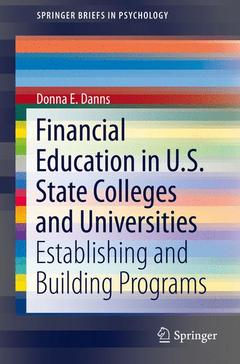Description
Financial Education in U.S. State Colleges and Universities, 1st ed. 2016
Establishing and Building Programs
SpringerBriefs in Psychology Series
Author: Danns Donna E.
Language: English
Subjects for Financial Education in U.S. State Colleges and Universities:
Support: Print on demand
Description
/li>Contents
/li>Biography
/li>Comment
/li>
This book addresses the uncertain state of financial literacy among today?s college students and examines steps colleges and universities are taking to address this widespread concern. This work introduces a four-fold typology of organizational models for college-based financial education programs and uses these as optics for grouping and presenting case studies. The case studies presented provide a holistic representation of how universities develop, sustain and grow financial education programs. Details on the nature of programs, goals, administrative support, resources, partnerships, scale of operations, program content and delivery, advertising, evaluation, program spinoffs, and much more are captured in this work. In addition to detailed case studies, this book presents general findings on the availability of and delivery modes for college-based financial education.
This work has significant utility for universities and colleges seeking to implement new financial education programs, changing existing programs, improving program relevancy or expanding program delivery on campus. It is an important contribution to the experiential understanding on how college students as consumers can acquire financial education as part of their broader college curricula and be able to better manage their financial lives.
Included in the coverage:
As financial literacy is increasingly recognized as a core life skill, it becomes more crucial as a component of higher education. Personal Financial Education in State Colleges and Universities in the U.S. is salient reading for college and university administrators, researchers, social workers and mental health professionals working with college students, policy analysts and faculty from any discipline interested in promoting the financial literacy of their students.
Introduces organizational models for college-based financial education programs?
Investigates the efficacy of current approaches to student financial literacy on U.S. college and university campuses
Provides case studies
Includes supplementary material: sn.pub/extras




